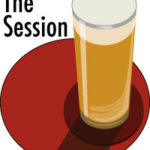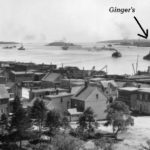 A bit like Greg, when I thought about the topic for this month’s edition of “The Session”, hosted and proposed by Tomme Arthur of Lost Abbey, I was initially disappointed as this one’s generality seems to be taking us another notch farther and farther away from the beer and nearer and nearer to a free for all, allowing for a drift towards that glaring lack of attention to detail that any good beer blogger should fear.
A bit like Greg, when I thought about the topic for this month’s edition of “The Session”, hosted and proposed by Tomme Arthur of Lost Abbey, I was initially disappointed as this one’s generality seems to be taking us another notch farther and farther away from the beer and nearer and nearer to a free for all, allowing for a drift towards that glaring lack of attention to detail that any good beer blogger should fear.
Yet the posts so far today have dispelled my fear as has just wallowing in a bit of recollecting. I have to go quite a ways back to a time when music and beer were more closely associated for me. Not as background music either – when one older brother came back from a trip to family in the early ’80’s, his most telling remark was that the British pubs he had visited all seems to have jukeboxes compared to our last trip, the summer of punk in 1977. And they were all playing “Born in the USA”. That’s not music. That’s music in a can.
 Stephen Beaumont’s post for the session – or one of them – makes a very good point about the music in a bar being a huge part of the
Stephen Beaumont’s post for the session – or one of them – makes a very good point about the music in a bar being a huge part of the
experience but it is also important to note that canned music is a fairly recent introduction into a lot of bars – a reality of only the last 35-25 years. Even in my youth of the early 80s many Halifax taverns were still only either loud with conversation or had live music. And it was that live music we sought out because we sang, too. Maritime Canadians like me have a capacity for shout-singing a good shanty with the best of them and we sang them in the taverns like the Lower Deck with certain songs being somewhat obligatory like “Barrett’s Privateers” by Stan Rogers and, of course, the cultural anthem “Farewell to Nova Scotia” which usually brought the house down in pubs like the Lower Deck with the long tables being hammered and dimpled by beer glasses keeping the beat, students and guys in the navy sharing their benches and trying to out do each other on the chorus:
God damn them all
I was told we’d cruise the seas for American gold
We’d fire no guns, shed no tears
Now I’m a broken man on a Halifax pier,
The last of Barrett’s Privateers
 The music was real and I was making it, the tavern was on a Halifax pier and the beer was then, for the most part, locally brewered draft by regionals Keiths and Moosehead even if a few imports were popping up like Newcastle Brown and the oddly present but welcomed Frydenlund lager from Norway – both also coastal brews. Stephen shares a bit of the flavour of Halifax that from that time, too, in his post:
The music was real and I was making it, the tavern was on a Halifax pier and the beer was then, for the most part, locally brewered draft by regionals Keiths and Moosehead even if a few imports were popping up like Newcastle Brown and the oddly present but welcomed Frydenlund lager from Norway – both also coastal brews. Stephen shares a bit of the flavour of Halifax that from that time, too, in his post:
Then there are times when beer trumps music, as it does in this story told to me many years ago by Kevin Keefe, founder of eastern Canada’s first brewpub, the Granite Brewery in Halifax. Winning Maritimers over to British-style ales wasn’t the easiest of tasks for Kevin, but in doing so he recognized that he would create for himself a sort of captive audience. And so, one by one, he convinced the locals to switch from the regional lagers and bland, blonde ales to his unique dark ales and best bitters, including, eventually, one long-time hold-out we’ll call Alan. Alan was for many months skeptical about the appeal of the Granite’s ales, Kevin told me, but after numerous tastes and talks, finally came around and began to drink the Best Bitter on a regular basis. This continued for some time, up to and including the evening when a hugely popular band was playing in a rival bar, attracting away the bulk of Kevin’s clientele.
Funny. The Alan I knew in the mid-80s of Halifax (me), the one hunting out the best place to belt out the best song at closing time, was starting to enjoy craft beer in a Halifax brewpub that actually pre-dated the one that came to be called the Granite Brewery. As I went on about back here, their equipment was originally at a sort of down at the heels place called Ginger’s which was a few blocks, a few rougher blocks nearer the train station and the docks, south of where the places now called the Granite and Ginger’s sits today. We’d also another source for early craft beer from a southern New Brunswick brewery, Hans House, that I do not think made it into the 90s.
But Kevin Keefe is right. It was the place as much as anything that made learning about his early efforts at craft beer so attractive and so different – whether that first harbour town tavern or later, at the Henry House, the new sort of upscale pub that he introduced into the scene that made for the setting. And those places of his had, for much of the time, something hard to find these day of mainly canned tunes or those days of table thumping massed messed choirage – the peace of no music at all.
